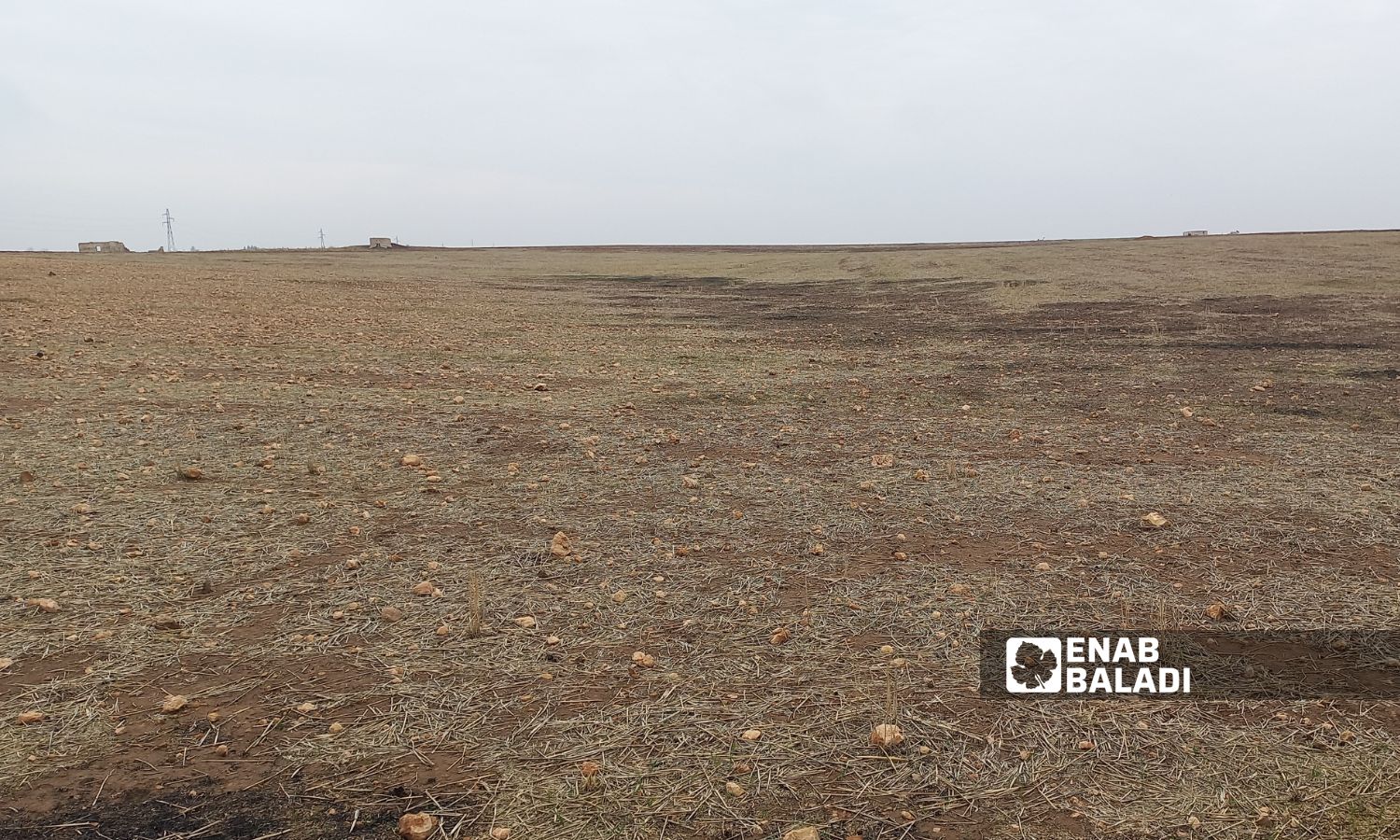



Enab Baladi – Ras al-Ain
The groundwater recession has caused extensive agricultural land in the western countryside of Ras al-Ain, northwest of al-Hasakah governorate, to become barren.
Obtaining water through wells requires drilling to a depth of more than 500 meters, which is costly for farmers interviewed by Enab Baladi in the area.
Amin al-Mardoud, a farmer in the village of Abu Jaloud, west of Ras al-Ain, stated that the recession of groundwater has impacted agriculture in the region, and it is difficult to drill wells because their depths reach about 600 meters.
He mentioned that the costs of drilling a well to this depth exceed $50,000 and pointed out that farmers in the area have been forced to abandon farming due to their inability to bear the costs of drilling wells and the difficulty of securing their operational requirements.
The farmer estimates that the recession of groundwater in his village has led to the closure of 95% of the farms, and the agricultural lands have turned into a desert awaiting rain.
Fatima al-Hamad, an agriculture worker in the village of Ajileh west of Ras al-Ain, mentioned that the recession of groundwater has led to the cessation of agriculture in her village for over ten years despite being a main source of livelihood for families.
On the other hand, Sultan al-Saddam, another farmer from the village of al-Shaara west of Ras al-Ain, stated that the recession of groundwater forced him to leave his village and head to the eastern countryside, where he found fertile lands and a suitable water level for crop cultivation.
He explained that the water availability level in the eastern countryside does not exceed 45 meters, noting that the village of al-Shaara has turned into a “desert,” where agriculture has completely stopped due to the difficulty of obtaining water from the wells and the high cost of drilling them.
The head of the Agriculture Office in Ras al-Ain, Omar Hamoud, told Enab Baladi that the recession of groundwater has led to the desertification of 420 thousand dunums of agricultural land in Ras al-Ain, pointing out that agriculture in the region depends on groundwater.
He explained that the area suitable for agriculture in the Ras al-Ain region amounts to 900 thousand dunums, including 250 thousand irrigated dunums concentrated in the eastern countryside and 420 thousand rainfed dunums located in the western and southern countryside, which have become desertified due to the decline in the water level, with low and almost non-existent production.
Hamoud indicated that rainfed lands are the most affected by the recession of groundwater, as they have become semi-deserts, resulting in significant losses for the farmers.
Hamoud called for the urgent need for the Interim Government to take measures to stop the recession of groundwater by encouraging and supporting farmers to use modern irrigation systems to preserve the remaining groundwater.
In addition to livestock breeding, agriculture is one of the essential professions for the majority of the population in the Ras al-Ain region, and it constitutes a major source of income for the residents.
Farmers in Ras al-Ain face difficulties in marketing their crops, traders monopoly, and the absence of governmental entities purchasing strategic crops, as happened in the wheat season this year.
The Syrian Interim Government (SIG) has not announced its intention to purchase this year’s cotton crop, and the crop is now vulnerable to monopolization by traders, with the price per ton ranging between 500 and 550 US dollars, while it ranged between 750 and 800 dollars last year.
Ras al-Ain and Tel Abyad areas are located on the Turkish border and are controlled by the Turkey-backed Syrian National Army (SNA), while they are surrounded by frontlines with the Syrian Democratic Forces (SDF), and the Turkish border is considered their only outlet to the outside world.
if you think the article contain wrong information or you have additional details Send Correction